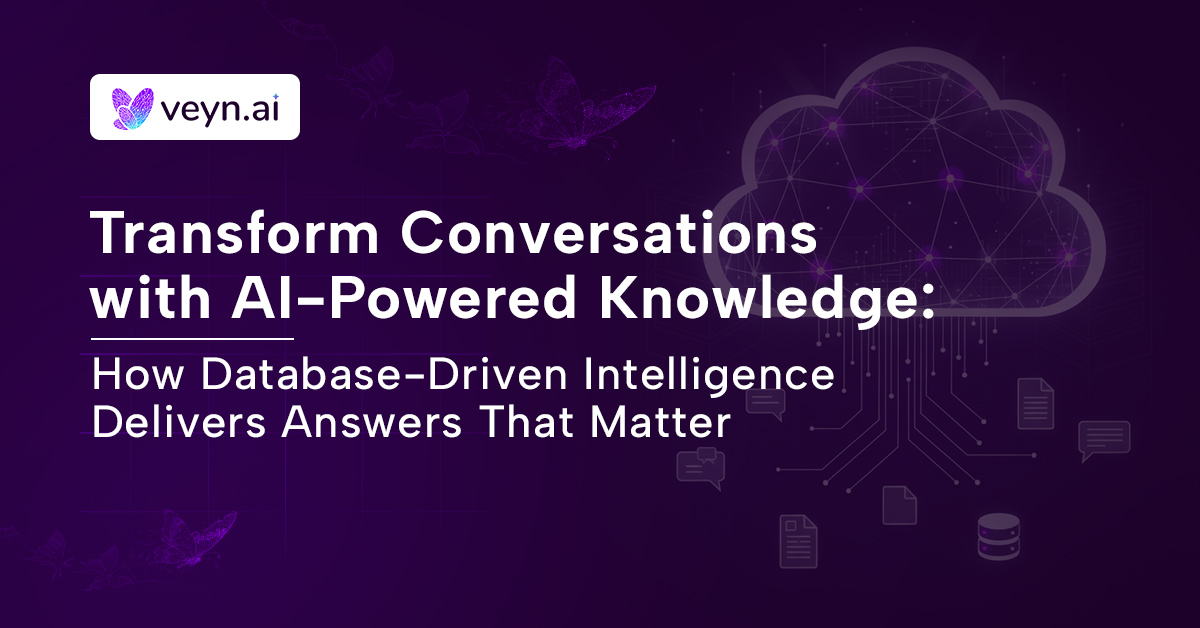Traditional chatbots, which rely on rigid tree-based structures, can often feel limiting and impersonal. They follow predefined paths, offering answers based on fixed rules rather than understanding the user’s unique needs. As the demand for more natural, intelligent interactions has grown, so has the need for technology that goes beyond these static responses. Enter conversational AI powered by database-driven knowledge bases, a groundbreaking shift that brings fluid, context-aware conversations, delivering answers that truly matter.
This shift to database-driven AI means that chatbots and virtual assistants are no longer constrained by rigid pathways. Instead, they access structured, relevant information stored in databases, providing users with highly accurate, personalized responses. In this post, we will explore the benefits of database-driven conversational AI and how it is transforming customer support, e-commerce, healthcare, and more.

Why Database-Driven Responses Are a Game-Changer
Unlike traditional tree-based chatbots, database-driven AI knowledgebases use structured data to deliver accurate, contextually relevant responses. Instead of relying on generic or pre-programmed paths, these AI systems access organized data, responding based on the specific inquiry, user profile, or context. Here is why this makes a difference:
- Enhanced Accuracy and Relevance
The accuracy of AI responses depends on the quality and structure of the data it accesses. Database-driven AI pulls from organized data fields, ensuring that responses are accurate, up-to-date, and relevant. For instance, if a user asks about a specific feature of a product, the AI can access product-specific data directly from the database, bypassing generic responses and providing tailored information.
- Improved Customer Satisfaction
With structured data powering responses, customers experience faster, more accurate assistance. According to research on AI response accuracy, users are more satisfied when interactions feel relevant and personalized. A database-driven knowledge base allows AI to respond accurately to varied inquiries without requiring manual intervention, which significantly boosts customer satisfaction.
- Increased Productivity and Efficiency
Database-driven AI knowledgebases streamline common tasks, freeing employees to focus on complex issues. In customer service and tech support, for instance, AI can handle routine inquiries like product troubleshooting, order status, and account issues. This improves team efficiency and lowers response times, making a positive impact on overall productivity.
How Structured Data Powers Smarter AI
The power behind database-driven AI knowledgebases lies in structured data. Unlike unstructured information, structured data is organized in fields, tables, or specific formats that are easy for AI to process. This structure enables AI to recognize patterns and context more quickly and accurately, enhancing response speed and relevance.
Imagine an AI in a healthcare setting, where quick access to accurate information is crucial. With structured data related to symptoms, conditions, and treatments, an AI knowledgebase can provide clinicians with real-time, relevant information for patient care. By tapping into organized data, the AI does not just deliver a generic answer, it offers insights tailored to the clinician’s query, making it a valuable resource in high-stakes situations.
Key Use Cases of Database-Driven AI Knowledgebases
- Customer Service: Database-driven AI enhances customer service by enabling faster, more relevant responses. For example, if a customer inquires about troubleshooting a product, the AI can pull precise, step-by-step instructions from the database, reducing wait times and improving the overall customer experience.
- E-Commerce: E-commerce platforms use database-driven AI to handle common questions about product details, shipping, and returns. AI pulls the latest data from the knowledgebase to provide quick and accurate answers, helping reduce cart abandonment and boosting customer loyalty.
- Healthcare: In healthcare, where information accuracy is critical, a database-driven AI can provide reliable, structured responses to inquiries about symptoms, medications, and treatments. This ensures that healthcare providers get the information they need, enabling better and faster patient care.
- Tech Support: Database-driven AI knowledge bases make a significant impact in tech support. When a user needs help with a technical issue, the AI can quickly retrieve relevant solutions from the database, reducing resolution time and providing a consistent support experience.
Steps for Implementing a Database-Driven AI Knowledgebase
For companies looking to integrate this powerful tool, here are a few steps to get started:
- Organize Your Data: Ensure that your data is well-structured and categorized to make it accessible for AI. This includes setting up fields for FAQs, troubleshooting guides, and customer support information.
- Integrate AI with Your Database: Link your AI with the structured data to allow for seamless information retrieval, ensuring your knowledge base is up-to-date and relevant.
Train Employees on AI Interactions: Training employees to work alongside AI and interpret its suggestions can maximize the technology’s impact and enhance overall productivity.
The Future of Conversational AI with Database-Driven Knowledgebases
The move from static, tree-based chatbots to intelligent, database-driven AI is transforming interactions across industries. As businesses adopt these advanced knowledge bases, they are better positioned to provide answers that matter, enhancing productivity, customer satisfaction, and operational efficiency. For professionals in customer support, IT, and e-commerce, database-driven AI knowledgebases offer actionable solutions for scaling intelligent, accurate responses.
Database-driven AI is not just a technological upgrade; it’s a step toward transforming user experiences. By leveraging the power of structured data for AI, companies can ensure that every interaction is meaningful, setting a new standard in conversational AI.


